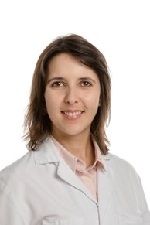PhD defence in times of COVID: an interview with Dr Linda Rossi - PDF Version
First of all, congratulations on your doctoral thesis, and thank you for agreeing to share your experience with the young community of the European SocieTy for Radiotherapy and Oncology (ESTRO).
Can you begin by introducing yourself?
Dear young ESTRO, first of all, thank you for caring for us, young colleagues! I’m an Italian medical physicist who moved to The Netherlands as I was driven by the charm of performing interesting research in an international environment. I currently continue my work at the Erasmus Medical Center, in Rotterdam, as a postdoc and medical physicist.
Would you mind explaining to us what your thesis was about?
My thesis was about the use of automated planning and non-coplanar beam setup in radiotherapy treatment planning. Automation enables us to improve plan quality and to perform investigations with a highly reduced investigator bias. And time is not a limitation anymore. Therefore, different techniques can be compared, unbiased. For example, one can investigate the advantage of non-coplanar setup compared with coplanar.
What brought you to study this field?
I could name different aims, but the most important to me was to show that we could improve our clinical routines if we never stopped doubting and seeking improvements.
To what extent did your daily working life change in 2020?
As a radiotherapy planning researcher, my daily working life was affected much less than the lives of many other professionals since I could perform all my research from home. However, all work discussion and social interaction went online, which considerably changed the efficiency and benefit they provide.
Can you identify anything positive about it?
I enjoyed the extra time I could spare for myself because I didn’t have to commute. Presentation, courses, workshops, and congresses were more accessible, with reduced travelling cost and time. Moreover, they were all recorded with the possibility of being watched (or re-watched) at any time.
How did the writing process of the doctoral thesis go?
The writing process went smoothly in some moments, and really hard in others. But cookies and breaks led me to complete it.
What helped you focus during that process?
The best tactic that helped me focus was to reserve many days in a row for writing. I faked a vacation from all colleagues and other projects.
How did you prepare for the remote defence?
Luckily my defence was partially remote; I was allowed to be physically in the room. Preparation required a lot of changes in the organisation to stay up to date with changes in coronavirus restrictions.
Can you explain to us how it took place?
Twenty guests were allowed in the big auditorium room, together with five out of nine committee members, my two paranymphs (ceremonial assistants or coaches in a ceremony), and myself. The other committee members joined online. Various cameras were installed in the room to record the ceremony from different viewpoints. The live stream was made available on YouTube (https://youtu.be/_xW3c2cT19o), which enabled my entire family, friends and colleagues to join me from any part of the world in that important moment.
.jpg.aspx)
Linda Rossi, PhD, Medical physicist
Postdoctoral researcher, Erasmus Medical Center
Rotterdam, The Netherlands
Do you have any advice for those undergoing a remote defence?
Enjoy it as if it were a fully live one. It is unbelievable how much technology can help us nowadays to reduce distances. I felt my loved ones next to me the whole time anyway.
Thank you so much for sharing your experience with us. All the best for your future endeavours!
Interviewed by:

Dora Correia, MD
Radiation oncologist
Postdoctoral research fellow
Massachusetts General Hospital
Harvard Medical School
Boston, USA.
https://linktr.ee/DoraCorreia